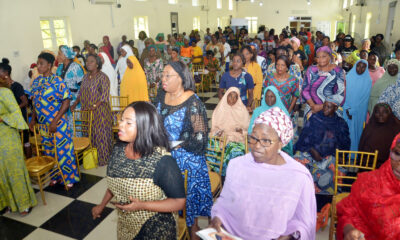- Banks’ Capital Adequacy Ratio Rises to 15.60%
The Capital Adequacy Ratio (CAR) of commercial banks improved from the 15.14 per cent it was as of February 2019, to 15.60 per cent in April 2019, according to data from the Central Bank of Nigeria (CBN).
This is coming as one of the global rating agencies, Moody’s Investors Service, has predicted that Non-performing Loans (NPLs) in Nigeria’s banking sector would decline to between seven and eight per cent this year, from 11.7 per cent at end of 2018.
Deputy Governor, Corporate Services, CBN, Mr. Edward Lametek Adamu, gave the update on CAR in his personal comment at last month’s Monetary Policy Committee (MPC) meeting’s communiqué, a copy of which was posted on the apex bank’s website at the weekend.
CAR is a measurement of a bank’s available capital expressed as a percentage of its risk-weighted credit exposures.
The CBN requires that banks with international subsidiaries maintain CAR of 15 per cent, while banks without international subsidiaries maintain CAR of 10 per cent.
But the minimum requirement for the systemically important banks is 16 per cent.
In addition, Adamu, said banking sector non-performing loans (NPLs) decreased to 10.95 per cent in April, from the 11.28 per cent it was as of February.
“However, the NPLs ratio is still higher than the prudential limit of five per cent.
“In the banking system, major financial soundness indicators (FSIs) further improved in April 2019 due mainly to recoveries, loan disposals and write-offs. Other vulnerabilities in the industry include high concentration and contagion risks as well as significant forex exposure,” he added.
According to him, these conditions have increased averseness to risk in the industry, leading to some form of asset substitution.
“It is especially concerning that credit to the private sector is declining and this needs to be halted and possibly reversed to strengthen economic activity and job creation,” he stated.
On her part, the Deputy Governor, Financial System Stability, CBN, Mrs. Aishah Ahmad, said while foreign exchange inflows dipped noticeably in April 2019, net flows remained positive at $4.7 billion.
This, according to her, is a reflection of strong investor confidence.
“These factors, combined with crude oil price levels, which have remained above $60 per barrel over the last six months, have supported stability and fuelled further accretion to reserves.
“Although there is some volatility in crude oil prices, along with uncertainty in global growth prospects, the naira exchange rate is expected to remain relatively stable in the medium-term even in the face of slight easing in domestic monetary conditions,” she added.
According to her, the sluggish domestic output growth environment underscored an urgency to dramatically enhance investment and expansion in the real sector via new credit.
Positive financial soundness indicators, she stressed, suggested that the banking industry is well-positioned to play a bigger role in this respect.
“Industry capital adequacy, liquidity and profitability continue to improve whilst non-performing loans (NPLs) reduced between February and April 2019. This picture of financial resilience is at odds with the current low levels of real sector lending, especially in the light of burgeoning lending to government observed in banks’ outsized subscriptions to risk-free treasury securities.
“For instance, information from bank staff reveals contraction in credit to the private sector between February and March 2019, even as income from trading activities increased vis-a-vis a reduction in non-interest income from credit activities.
“While factors such as residual low risk appetite in the light of recent high levels of NPLs and significant asset portfolio write-offs are duly noted, the industry must dramatically increase lending to the real sector to strengthen the economic recovery, bolster domestic productivity and create jobs,” the Deputy CBN governor said.
On his part, the Deputy Governor, Economic Policy, CBN, Dr. Okwu Nnanna, pointed out that economic growth in the country remains muted amidst sub-optimal credit to the private sector and commercial banks’ preference for public sector lending.
In his contribution, the Deputy Governor, Operations, CBN, Mr. Folashodun Shonubi, said sustained stability in the banking industry was reflected in improvement of banks’ prudential measures, “though conditions highlighted the need for the Bank to intensify current regulatory and supervisory measures to ensure further progress.”
Meanwhile, one of the global rating agencies, Moody’s Investors Service, has predicted that NPLs in Nigeria’s banking sector would decline to around seven and eight per cent this year, from 11.7 per cent at end of 2018.
“Higher oil prices will constrain new NPL formation while high loan-loss reserves will allow banks to write off some of their bad debts. These credit positives will be moderated by lingering risks from high loan concentrations and high delinquency levels.
“System-wide tangible common equity will be stable at 16 per cent of risk-weighted assets at year-end 2018, which will be sufficient to absorb losses under our baseline scenario. We expect subdued loan growth and prudent dividend pay-outs to support banks’ capitalisation metrics,” it added.


 Forex2 weeks ago
Forex2 weeks ago


 Naira1 week ago
Naira1 week ago
 Naira4 weeks ago
Naira4 weeks ago
 Company News4 weeks ago
Company News4 weeks ago




 Naira2 weeks ago
Naira2 weeks ago
 Billionaire Watch1 week ago
Billionaire Watch1 week ago




 Naira3 weeks ago
Naira3 weeks ago




 Naira1 week ago
Naira1 week ago




















